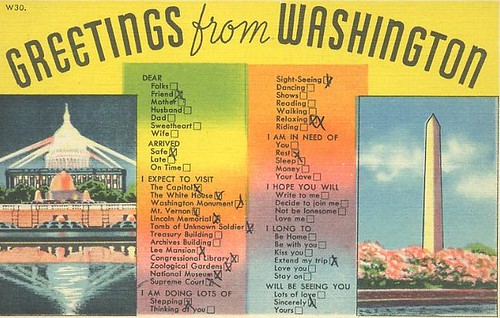In looking at the Mira Uncut blog, I discovered that there was a "TEDx" conference in Detroit, to bring together the region's innovators, to help jumpstart the regional economy there, which for the most part is devastated.
The
TED conference is a national conference on ideas and innovation. The
TedxDetroit conference was a licensed, regional version. It was open by application and invitation, so it wasn't a free for all.
I thought this was pretty interesting. Because of the Takoma Theatre issue, I was thinking about my paper, "
Arts, culture districts, and revitalization," which I have to say is pretty good (then again, it's it's derived from the work of other very very good people), and the points it makes about consumption versus production of art.
Much of the DC arts agenda is focused on arts consumption and what we would call presenting institutions like the Smithsonian Museums, the National Gallery, or the Kennedy Center.
There isn't a lot of support for the nurturing and development of artistic disciplines and artists themselves.
The same goes for DC's creative economy. For a long time I've made the joke that in DC, "big government trickles down and shapes little government, that is the local government, in its image."
And the federal government, Stephen Chu excepted maybe, is not nimble, and especially these days, not forward thinking.
This shapes the city in negative ways.
I was reading an essay by the now deceased Tony Judt in the
New York Times, "
My Endless City" about New York City and World Cities, and he mentions why he thinks that New York City, even in twilight, is truly a world city.
It's because the city itself is focused outward, not inward.
He wrote:
And yet, New York remains a world city. It is not the great American city — that will always be Chicago. New York sits at the edge: like Istanbul or Mumbai, it has a distinctive appeal that lies precisely in its cantankerous relationship to the metropolitan territory beyond. It looks outward, and is thus attractive to people who would not feel comfortable further inland. It has never been American in the way that Paris is French: New York has always been about something else as well.He also mentions that Washington was "the Brasilia of its time" which I have to admit is true and puts DC's disconnection in some perspective perspective.
A TedxLocalWashington conference related to the development and emergence of a more local creative/innovative/knowledge economy is in order, recognizing that the local creative economy does have to link to and engage with what we might call the "national" creative economy that does exist somewhat within the federal government.
Basically, the idea is how to put in more "Silicon Valley" into an innovation ecology that is decidedly more "Route 128"-like. See AnnaLee Saxenian's book,
Regional advantage: culture and competition in Silicon Valley and Route 128, and the recent
Wall Street Journal article, "
Silicon Valley 3.0: Tech's New Wave."
And given how "Washington" is excoriated by the rest of the country, it would make sense to better hedge our bets and develop a more balanced economy.
Labels: building a local economy, change-innovation-transformation, creative economy, innovation ecologies




0 Comments:
Post a Comment
<< Home